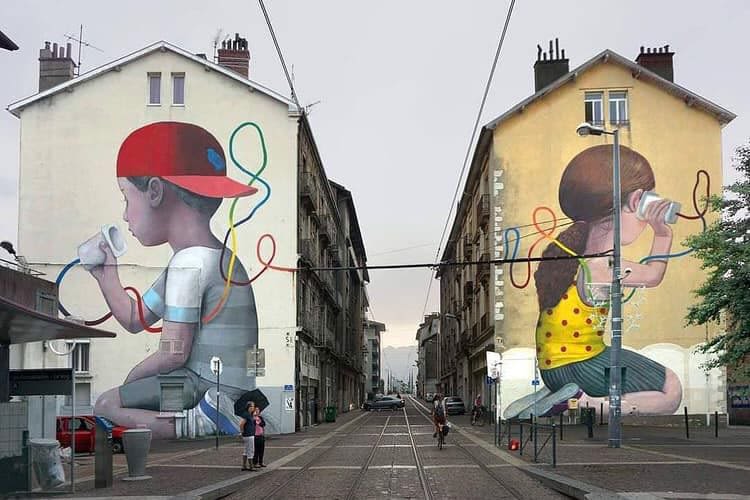
We are all Internet Users

- Written byPost-Grad Community
- Published date 13 September 2021

Written by Elena Arzani, FHEA, Master of Arts, Central Saint Martins. PgCert Academic Practice, Chelsea College of Arts. UAL Associate Lecturer
We are all Internet Users / We are all Internet Users (Siamo tutti internauti) is a pioneering project on digital education and cyberbullying designed and delivered by Elena Arzani (FHEA, Master of Arts, Central Saint Martins. PgCert Academic Practice, Chelsea College of Arts. UAL Associate Lecturer).
Elena is originally from Codogno, the Italian town sadly well-known for being the centre of the European pandemic spread. In 2019, while visiting her parents, she experienced the military state of emergency and was forced to lockdown in what became the Covid Red zone. For the first two weeks, the City Hall and the Government shared news only via the internet. Fake news populated the web, while the Media took months to align and become the national authority to trust, updating the citizens on the ongoing situation and safety measures.
In a few weeks, people around the world faced the same scenario. Online meetings, as well as blended forms of teaching and learning, were adopted.
Arzani had just become a Fellow of the Higher Education Academy. She was working on her academic research willing to pursue a PhD in Musicology. But she soon understood she had to step out, becoming a social activist and sharing her knowledge with the local communities of people.
During the Covid-19 emergency, schools delivered online courses. The threshold of young internet users lowered down. Consequently, students aged between 6 to 10 years made their first step on the world wide web.

The introduction of technological devices is new in Italian schools. It soon emerged that both the primary school teachers, students and their parents lacked an appropriate education involved with the use of digital technologies and the internet with its implications on the user health. In February 2021, two children aged 7 died as victims of cyberbullying and TikTok challenges. In the same period, the Italian Government issued new rules to contrast bullying and cyberbullying phenomena. Academically, Elena adopts the UAL good practices in social justice, and she has been contributing to Shades of Noir for years. She implemented her Master knowledge in Design and Pedagogy to create a multidisciplinary 3-Phases workshop to train Teachers and Parents on digital technologies. She provided them with the guidelines to protect user wellness by accessing the law and specialized institutes in an emergency. Phase 1 involved the parents. It focused on building trust and mutual exchange of support between the school staff and families. Hence, through multimedia resources adapted according to the age group, the 2nd phase of the workshop was delivered to more than a thousand primary school children, using art as therapy and as a conduit for sharing information.

The workshop supported cognitive development. A blend of reflections and art sessions fostered critical sense while building the basis for complex information. Surprisingly pupils demonstrated an early comprehension of the cyberbullying and online challenges phenomena. Furthermore, the majority of them knew about the facts of crime news involving children of their age. Therefore, Elena felt vital to support the correct development of a sense of justice, empathy and emotional awareness, fostering the sense of belonging to the group of peers and facilitating a collective reflection on personal responsibility, both as actors and as spectators.

The final phase provided the teachers with a peer-to-peer training course. The pedagogy focused on research and methods and allowing them to autonomously embrace a conscious use of devices, together with the internet and social networks. The development of teaching practices showing the pupils and their families the correct and safe use of devices in the classroom and home, the risks associated with the technologies and the phenomenon of cyberbullying.
In the end, the project involved about 1.500 people. The outcome was outstanding. The parents expressed their positive consent for the educational workshop, which supplied them with more info concerning their children’s habits and use of internet devices. The students showed a high level of engagement and a will to share the contents learned with teachers and families. They also opened up and expressed a sense of well-being and belonging to the school environment.


Elena Arzani’s project is supported by the Ministry of Education’s regional funding. The national Press acclaims it as a success.
Elena’s intervention permanently modifies the Italian primary school curriculum of civic education.
Related links
▪ Follow Elena on Instagram (https://www.instagram.com/elenaarzani)
▪ View Elena's website (https://www.elenarzani.com)
▪ Find out more about the workshop (e.arzani@arts.ac.uk)
UAL Post-Grad Community
Established in 2013, Post-Grad Community is an inclusive platform for all UAL postgraduate students to share work, find opportunities and connect with other creatives within the UAL and beyond. Find out more
Post-Grad Stories
A thriving online magazine of our postgraduate student voices sharing thought-provoking experiences, practices, thoughts and articles about what matters to them.
Download the PDF Guide to writing articles for Post-Grad Stories
Want to write an article? Get in touch with the Post-Grad Community team PGCommunity@arts.ac.uk